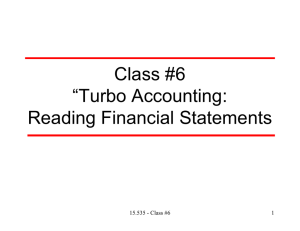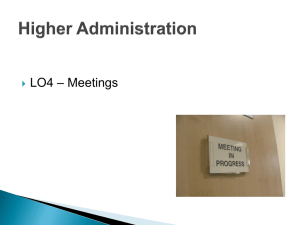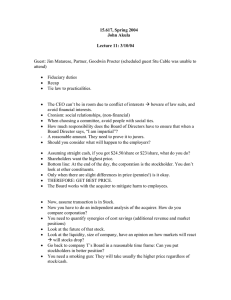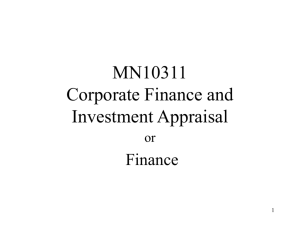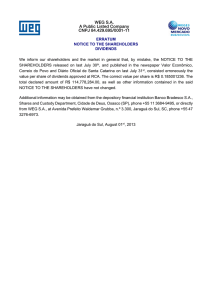Singapore Private Limited Companies
advertisement
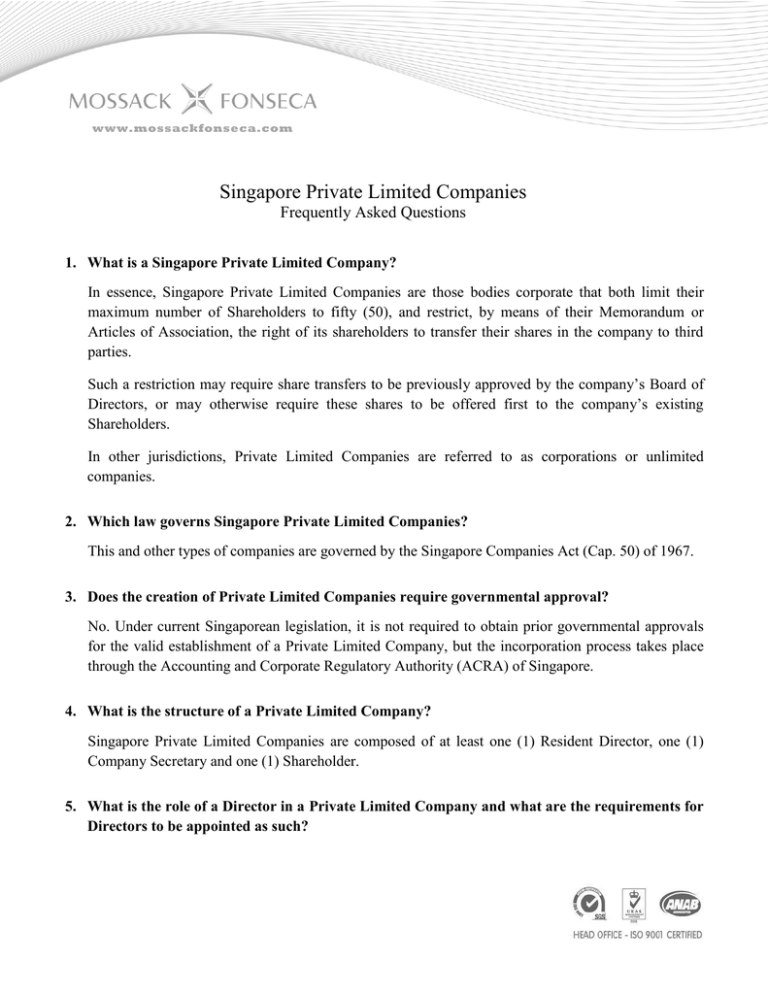
www.mossackfonseca.com Singapore Private Limited Companies Frequently Asked Questions 1. What is a Singapore Private Limited Company? In essence, Singapore Private Limited Companies are those bodies corporate that both limit their maximum number of Shareholders to fifty (50), and restrict, by means of their Memorandum or Articles of Association, the right of its shareholders to transfer their shares in the company to third parties. Such a restriction may require share transfers to be previously approved by the company’s Board of Directors, or may otherwise require these shares to be offered first to the company’s existing Shareholders. In other jurisdictions, Private Limited Companies are referred to as corporations or unlimited companies. 2. Which law governs Singapore Private Limited Companies? This and other types of companies are governed by the Singapore Companies Act (Cap. 50) of 1967. 3. Does the creation of Private Limited Companies require governmental approval? No. Under current Singaporean legislation, it is not required to obtain prior governmental approvals for the valid establishment of a Private Limited Company, but the incorporation process takes place through the Accounting and Corporate Regulatory Authority (ACRA) of Singapore. 4. What is the structure of a Private Limited Company? Singapore Private Limited Companies are composed of at least one (1) Resident Director, one (1) Company Secretary and one (1) Shareholder. 5. What is the role of a Director in a Private Limited Company and what are the requirements for Directors to be appointed as such? Directors constitute the management of the Private Limited Company, and there is a minimum of one (1) Resident Director required for its constitution. Being a Resident Director implies having Singaporean Citizenship, Singaporean Permanent Residence, or being an Employment Pass/Approval-in-Principle/Dependent’s Pass holder. Other Directors must be individual persons, bodies corporate are not permitted; and of any nationality or residence. Directors may also be Shareholders. It is important to mention that individual Directors must be at least eighteen (18) years of age and in full legal capacity. The following are specific exclusions that disqualify individuals from serving as Directors: Undischarged bankrupts (unless they have obtained prior authorization from the High Court or the Official Assignee); Persons who are under disqualification orders made by the Court; Persons convicted of specified offences or offences involving fraud or dishonesty punishable with imprisonment for three (3) months or more. (This disqualification is for five (5) years from the date of conviction of the relevant offence, or, where the person has been sent to prison, from the date of release). 6. What is the role of a Company Secretary in a Private Limited Company? The Company Secretary must be a natural person ordinarily resident in Singapore. The role of the Company Secretary consists of ensuring compliance on behalf of the Private Limited Company, before relevant Singaporean authorities. If the Private Limited Company has only one (1) Director, said Director may not perform the role of the Company Secretary. 7. What is the role of a Shareholder in a Private Limited Company and what are the requirements for Shareholders to act as such? This constitutes the ownership of the Private Limited Company, and while there is a minimum of one (1) Shareholder, required for its constitution, the number of Shareholders may not exceed fifty (50). Shareholders may be individual persons or bodies corporate, and of any nationality or residence. Shareholders may also be Directors. Shareholders not personally liable for debts and losses of Private Limited Company. 8. What are the incorporation documents of a Private Limited Company? A Singaporean Private Limited Company is formed by one (1) or more incorporators by means of filing the proposed Memorandum and Articles of Association, along with other supporting documentation, before ACRA. This document represents the official constitution of the new Private Limited Company, and its full contents are considered to be company law. All procedures are to be included in these documents, as they now affect all of the new company’s affairs. The Memorandum and Articles of Association shall reflect: The name of the company, The registered office, The objects of the company, The share capital and class of shares, Initial subscription of shares, Background on the subscribers to the Memorandum; The number of Directors to conform the Board, Other provisions dealing with meetings and adopting resolutions. Once the document submission is complete, the registrar at ACRA will certify the incorporation of the Private Limited Company, and confirm the type of entity. 9. Who is liable for the activities of a Private Limited Company? As mentioned above, because Private Limited Companies are considered independent from its owners, neither its Directors nor its Shareholders are liable for the company’s debts. There are no further obligations for the Shareholders than those of paying up their shares, and their assets remain unaffected in the event that the Private Limited Company is prosecuted by its creditors. 10. Are there any capital requirements for Private Limited Companies? Singapore Private Limited Companies must only pay up SGD1.00 as minimum capital to be registered, but additional capital may be added thereafter. The Companies Act allows for the use of goods and/or services to be used as capital in lieu of cash, if all the parties agree to do so, and establish a value for said goods and/or services. 11. How are Private Limited Companies incorporated? Incorporating a Private Limited Company before ACRA is extremely simple and the information requested is straightforward, as follows: Company Name Brief Description of Business Activities Shareholder Information Director Information Registered Address This information may be submitted as soon as the proposed name is approved by ACRA, and incorporation may be confirmed in a matter of hours. A soon as the incorporation process has concluded, an email notification is sent, including the new company registration number. This registration number is called the Unique Entity Number (UEN), and gives legitimacy and legal personal to all registered entities. 12. Must Private Limited Companies hold Annual General Meetings (AGM)? Yes. It is required for every Private Limited Company to hold its AGM once every calendar year, or fifteen (15) months from the date of the last AGM, whichever happens earliest. There is an exception for newly incorporated Private Limited Companies, which are given eighteen (18) months, from their date of incorporation, to hold their first AGM. The Private Limited Companies financial statements are tabled and approved at the AGM, and the AGM may be held anywhere in the world, or via written resolutions. 13. What are Exempt Private Companies? Any Private Limited Company whose sales turnover for the financial year does not exceed five million Singapore Dollars (SGD5MM); that does not have more than twenty (20) Shareholders, and no corporate Shareholders, is considered to be an Exempt Private Company. This type of Private Limited Company enjoys certain exemptions from the provisions set forth by the Companies Act, including the annual audit requirement with ACRA. It is also exempted from prohibitions against loans to its Directors or to companies related to its Directors. Incorporation of Exempt Private Companies is exactly the same as regular Private Limited Company, they are just given this new denomination once their financial activities are clearly identified. 14. Is a Private Limited Company subject to corporate taxation? Yes. Where a Private Limited Company, incorporated after 2005, has less than twenty (20) individual Shareholders, or when there are corporate Shareholders, at least one (1) is an individual with at least 10% ownership, of the Private Limited Company, the first SGD100, 000.00 of taxable income is exempt from taxes and the next SGD200,000.00 receive a 50% tax exemption. This exemption applies for qualifying companies within the first three (3) consecutive years of assessment of the Private Limited Company. 15. Do Private Limited Companies pay withholding taxes on dividends, interest and royalties? No withholding tax is levied on dividends paid by Singaporean resident companies. This is particularly beneficial to the Private Limited Companies Shareholders, who are not deducted for this income. Singapore levies a 15% withholding tax on interest and a 10% withholding tax on royalties paid by Singaporean Private Limited Companies to non-residents. Tax treaties may reduce these rates depending on the country of residence of the recipient. 16. What accounting requirements do Private Limited Companies have? IRAS requires that each Private Limited Company submit its Estimated Chargeable Income (ECI) for each Year of Assessment (YA), no later than three (3) months after the financial year ends. In Singapore, the financial year runs like the calendar year, from January 1 to December 31, meaning that the deadline for the submission of Estimated Chargeable Income is March 31, immediately following the previous financial year. Even if the annual income is zero for the Private Limited Company, the Estimated Chargeable Income must be filed as NIL. Additionally, all Singapore Private Limited Companies must file annual accounts, in accordance with the Singapore Financial Reporting Standard (SFRS), containing the following: Profit and Loss Account; Balance Sheet; Cash Flow Statement; and Equity Statement. As per Singapore Law, accounting records must be kept for five (5) years after their filing date. Private Limited Companies must also file corporate income tax returns. This filing consists of submitting the Audited or Unaudited Report and Tax Computation, also referred to as Form C. Private Limited Companies must also submit a Financial Report, in accordance with the type of company and its activities. In sum, this report contains the balance sheet and income statements; supporting notes and disclosure of significant accounting policies applied by the company; disclosure of company’s operations; as well as Shareholders’ and Directors’ interests. 17. What are the different types of Financial Reports that Private Limited Companies must submit? The types of Financial Reports that may be submitted are as follows: 1. Unaudited Report: This category applies to Private Limited Companies whose sales turnover for the financial year does not exceed five million Singapore Dollars (SGD5MM); who do not have more than twenty (20) Shareholders, or do not have corporate Shareholders. By meeting the requirements of this category, the Private Limited Company is automatically considered an Exempt Private Company (EPC). 2. Audited Reports: This category applies to Private Limited Companies whose sales turnover for the financial year exceeds five million Singapore Dollars (SGD5MM); who have more than twenty (20) Shareholders, or who have corporate Shareholders. 3. Filing of Financial Statements in XBRL: Finally, this category applies to Private Limited Companies that are insolvent and have a corporate Shareholder during the financial year. This case requires the filing of financial statements in XBRL format during the filing of the Annual Return. 18. How are Private Limited Companies dissolved and wound up? Winding-up of Private Limited Companies may take place by two (2) mechanisms: voluntary winding-up by means of a Shareholders’ Resolution; or by Court order, as requested by the Private Limited Company itself, a creditor, a contributory, a liquidator or a judicial manager of the Private Limited Company. The winding-up process requires the appointment of a liquidator will be appointed, and it is the liquidator’s duty to collect and, as the title suggests, liquidate the assets of the Private Limited Company. The typical order of disbursement consists of paying off the Private Limited Companies debt, and distributing any remaining funds to the Private Limited Companies Shareholders. The conclusion of the winding-up process, leads to the dissolution and de-registration process, so that the Private Limited Company may formally cease to exist. 19. What are the advantages of using a Private Limited Company? Singapore resident Private Limited Companies are often used in tax-planning structures, as they enjoy a broad range of tax treaties, making it possible to benefit from tax savings on profit distributions made by investments ultimately owned by the non-Singaporean resident shareholders of the Singapore Private Limited Company. Furthermore, Private Limited Companies enjoy the following advantages: Limits the liability of shareholders. Separate legal identity. Easier transfer of the ownership of a Private Limited Company. Clear Companies Act, which governs the organization and procedures to be followed by Private Limited Companies and other types of companies. Sets the minimum number of shareholders and directors at one (1). Exempt Private Companies (EPCs) enjoy the benefit of not auditing their accounts if the Private Limited Companies annual turnover falls below SGD5 million. 20. Whom do I contact if I have other questions that have not been answered? For detailed information pertaining to specific cases, please contact our Singapore Office at mfsingapore@mossfon.com. JUNE-2014-LC JUNE 2014-LC

